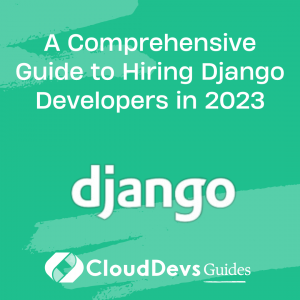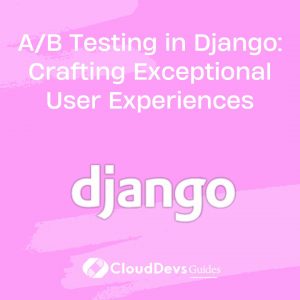A Comprehensive Guide to Hiring Django Developers
In this guide, we’ll go through all the information related to hiring dedicated Django developers, a highly desirable skill set given the ongoing digital transformation and Django’s continued popularity for web development. The guide will go into the importance of Django, what is required for a Django developer, and the techniques used for evaluating these skills. It will also go through various roles and experience levels to consider when you hire Django developers.
Table of Contents
We will discuss several hiring models, ranging from full-time employment to freelancing engagements, to provide a variety of options to find the services of dedicated Django developers. This compilation is meant to help both new and established organizations identify suitable Django talent to meet their specific needs, whether they need to scale their existing team or start from scratch. It all comes out to having the knowledge to hire Django developers who will drive your projects forward with their experience and passion.
Rising Demand for Django Developers
Django is a high-level Python-based web framework that follows the Model-View-Template architecture structure. It is intended to speed up development and encourage clean, pragmatic design by providing an extensive range of tools for fast developing web apps. The Object-Relational Mapping method for database interactions and the automatic admin interface are two notable Django features.
The continuous demand and simplicity of Python, Django’s comprehensive out-of-the-box capabilities, and the growth of the tech industry all resulted in a rise in demand for Django developers in 2023. This is especially true in Python-dominated fields like machine learning and data science. Django developers, even those who work remotely, are a valuable asset to development teams due to their versatility.
Whether you hire remote Django developers or in-house teams, their ability to create a wide range of applications – from social media platforms to machine learning applications – has proven beneficial. In a period when remote work is becoming more common, employing remote Django developers provides flexibility and access to a larger talent pool, confirming their status as a highly sought after resource in the tech sector.
Essential Steps to Consider Before Hiring a Django Developer
- Identify Your Project Requirements:
Before hiring a Django developer, it’s essential to clearly define your project’s requirements and goals. You should understand the project’s scope, the features you want to implement, the project timeline, and the potential difficulties that could arise.
- Understand the Skills Required:
Django developers should have a strong understanding of Python, the Django framework itself, front-end technologies like HTML, CSS, and JavaScript, database management, and RESTful APIs. Depending on your project, you may also need a developer with experience in specific areas such as machine learning, data analysis, or specific APIs.
- Determine the Level of Expertise Needed:
Django developers can range from junior to senior levels. The complexity of your project will help determine the level of developer you need. Junior developers can handle simpler tasks, while mid-level and senior developers can tackle more complex projects and offer strategic input.
- Choose a Hiring Method:
Decide whether you’ll hire a freelancer, an in-house developer, outsource the project to a development agency, or hire remote Django developers. Each of these options has its pros and cons. Freelancers and remote Django developers may offer flexibility and a wider pool of talent, in-house developers could provide more control and continuity, while agencies might offer the comprehensive support of a full team.
- Create a Job Description:
Draft a detailed job description that lists the necessary skills, experiences, and responsibilities for the role. Be specific about your project’s nature and your expectations.
- Screening Process:
Design a screening process that could involve reviewing portfolios, conducting technical interviews, administering coding tests, and possibly assigning trial tasks.
- Check References:
If possible, check the references of your potential hires. Past client feedback can provide valuable insights into a developer’s reliability, technical skills, and ability to meet deadlines.
- Consider the Cost:
Django developers’ rates vary based on their skill level, experience, location, and the complexity of your project. Have a budget in mind and consider it when choosing a developer.
- Plan for Onboarding:
Once you hire a developer, plan for an effective onboarding process. This will help the developer understand your project’s requirements better, and they will become productive more quickly.
- Think Long-Term:
Ideally, you’ll want to develop a long-term relationship with your developer. Consider their career development and how you might retain them. Providing opportunities for continuous learning, offering a good work environment, and recognizing their contributions can be key for retention.
Skills to Look for in a Django Developer
- Proficiency in Python:
Since Django is a Python-based framework, the developer should have a strong grasp of the Python programming language, including its syntax, standard libraries, and best practices.
- Expertise in Django Framework:
The developer should have a comprehensive understanding of Django itself, including its MVC architecture, Django ORM, middleware, and templating engine.
- Knowledge of Front-End Technologies:
Django developers often need to work with front-end technologies, so they should be familiar with HTML, CSS, and JavaScript. Knowledge of front-end frameworks like React, Angular, or Vue.js is a bonus.
- Understanding of Databases:
Django developers should understand how to work with databases. They should be comfortable with Django’s ORM for database access, and also understand SQL and the basics of database design.
- Experience with RESTful APIs and Web Services:
In many web applications, Django is used to build the back-end that interacts with a front-end through a RESTful API. Developers should know how to build and use APIs and might need to understand other web services as well.
- Version Control Systems:
Knowledge of version control systems like Git is important for any developer. It allows for efficient tracking of code changes and collaboration with other developers.
- Knowledge of Deployment and Testing:
They should be familiar with deploying Django applications on different platforms (like Heroku, AWS, or GCP), and they should know how to write and run tests to ensure code quality.
- Understanding of Security Principles:
A good Django developer should have a basic understanding of web security principles and know how to write secure code to protect the application from common threats.
- Problem Solving Skills:
Coding is essentially problem-solving. A good developer should be able to think through problems logically, break them down into smaller parts, and work through each piece systematically.
- Communication Skills:
Clear communication is crucial in a development team. The developer needs to effectively communicate their ideas, listen to others, and work well in a team environment.
- Continuous Learning:
Web development is a field that is constantly evolving, so dedicated Django developers should be committed to continuous learning and keeping their skills up-to-date. These dedicated Django developers not only bring their expertise to the table, but they also strive to stay at the forefront of technological advancements, ensuring they remain valuable assets in this dynamic field.
Where to Find the Right Django Developer
Finding the perfect Django developer for your project might be difficult. However, if you’re trying to hire Django developers, there are various resources and platforms that can help you get started:
- Job Boards:
Posting a job on tech-focused job boards like Stack Overflow Jobs, Dice, and Indeed can attract a pool of qualified candidates. There are also Python-specific job boards, like Python.org’s job board.
- Freelance Platforms:
Websites like Upwork, Freelancer, and Toptal can be useful for finding freelance Django developers. Toptal, in particular, prides itself on connecting clients with the top 3% of freelance developers.
- Social Networking Sites:
LinkedIn is a professional networking site where you can post jobs, search for candidates directly, and receive recommendations. GitHub is also a great platform to find developers based on their contributions and projects.
- Django and Python Events:
Conferences, meetups, and hackathons are great places to meet talented developers. Events like DjangoCon, PyCon, and local Django/Python meetups are worth considering.
- Online Communities:
Participate in online communities like Stack Overflow, Reddit, and Django’s official forum. You can find developers who are active in the community and show a solid understanding of Django through their posts and responses.
- Coding Bootcamps and Schools:
Many coding bootcamps and schools teach Django as part of their curriculum. You could reach out to these institutions for recent graduates looking for work.
- Recruitment Agencies:
Specialized tech recruitment agencies have resources and experience to find and vet potential candidates based on your specific needs.
- Outsourcing Companies:
If you want to delegate the whole hiring process, consider working with an outsourcing company. They can provide you with a dedicated team based on your project requirements.
Remember, no matter where you find your candidates, it’s important to have a clear job description and hiring process to assess their skills and fit for your project.
How to Evaluate a Django Developer
Evaluating a Django developer, especially when trying to hire Django developers, is an exhaustive process that assesses their technical talents, problem-solving skills, and other soft skills such as communication and teamwork. Here are some important things to keep in mind during this important phase of the hiring process:
- Review their Portfolio:
Look at the projects they have completed in the past. Their portfolio can give you insight into their coding style, project diversity, creativity, and attention to detail. Check their GitHub profile to see their code, contributions, and how they collaborate with others in the community.
- Technical Interview:
Conduct a technical interview to assess their knowledge of Python, Django, databases, front-end technologies, and other skills relevant to your project. They should also demonstrate an understanding of web application architecture and principles such as RESTful API design, MVC pattern, etc.
- Coding Tests:
Coding tests can be a good way to assess a developer’s coding skills, problem-solving abilities, and efficiency. You can use platforms like HackerRank, Codility, or LeetCode to administer these tests. Be sure to include problems relevant to the work they’ll be doing.
- Trial Project:
If feasible, provide a small, non-critical project or task related to your main project. This will allow you to see their skills in action, including their ability to meet deadlines and their communication skills.
- Reference Checks:
Ask for references from past employers or clients. This can provide insights into the developer’s reliability, ability to work in a team, and how they handle feedback and challenges.
- Culture Fit:
A developer can be technically excellent but still not a good fit for your team. Assess whether the developer’s work style, communication preferences, and values align with your team’s culture.
- Continual Learning:
Technology evolves rapidly, and developers should too. A willingness to learn and adapt is a key trait. Look for signs of this in their career progression, the variety in their portfolio, and their responses during the interview.
The aim is to identify a developer that not only has the essential talents but also fits into your team culture and engages in the vision of your project. This comprehensive strategy can assist you in hiring a dedicated Django developer that will provide genuine value to your company.
Determining Compensation
Determining the compensation for a Django developer can depend on several factors. Here are key aspects to consider:
- Experience and Skill Level:
Developers with more experience or specialized skills tend to command higher salaries. A junior Django developer would typically earn less than a mid-level or senior Django developer.
- Geographical Location:
The location of the developer or the standard market rate in the location of the job can significantly influence the compensation. Developers in areas with a higher cost of living often demand higher salaries.
- Project Complexity:
More complex projects that require a broad set of skills or deep expertise in certain areas may justify higher compensation.
- Type of Employment:
Full-time, permanent employees often receive benefits that contract or freelance workers do not, such as health insurance or retirement contributions. These benefits should be factored into the total compensation.
- Industry Norms:
Different industries can offer different compensation packages for similar roles. Research the standard pay in your industry to ensure your offer is competitive.
To determine a Django developer’s compensation:
- Research:
Start with a broad research on typical salary ranges for Django developers. Websites like Glassdoor, Payscale, and Indeed provide salary data which can be filtered by location, experience, and skill level.
- Budget:
Consider your company’s budget. It’s important to find a balance between what your company can afford and what is competitive in the market.
- Consider the Complete Package:
Compensation is not just about salary. It can also include benefits like health insurance, vacation time, remote work options, flexible hours, professional development opportunities, and more.
- Negotiation:
Be prepared for potential negotiation with the candidate. Make sure you know the maximum you can offer and what aspects of the compensation package might be adjustable.
When looking to hire Django developers, offering competitive salary is important because it helps to attract and retain top talent. However, it is equally important to build a healthy, exciting job environment that makes developers, whether seasoned veterans or new hires, feel valued and see opportunities for personal and professional growth.
Retaining Django Developers
Retaining skilled and dedicated Django developers is important for the success and expansion of your projects. Here are some ideas to assist you retain your developers:
- Offer Competitive Compensation:
Ensure your compensation packages are competitive and reflect your developers’ experience and skills. Regularly review and adjust salaries to keep up with the industry standards.
- Career Growth Opportunities:
Provide opportunities for career development and progression. This could be through challenging projects, training, certifications, or a clear promotion path.
- Professional Development:
Support their continual learning by providing resources for education or covering costs for courses, seminars, or conferences related to their work.
- Healthy Work Environment:
Maintaining a healthy work environment that encourages collaboration, respect, and work-life balance is crucial. This is particularly important when hiring remote Django developers, as they may face unique challenges associated with remote work. Providing flexible work hours, establishing clear remote work policies, and organizing virtual team building activities can greatly enhance the work experience and productivity of your remote Django developers.
- Recognition and Rewards:
Recognize and appreciate your developers’ hard work. This can be as simple as giving praise in team meetings, or more formal rewards like bonuses or Employee of the Month programs.
- Involve them in Decision Making:
Involve your developers in decision-making processes related to projects they are working on. This can increase their sense of ownership and commitment to the project.
- Maintain Open Communication:
Foster open and honest communication. Regular feedback and open-door policies can help developers feel their opinions are valued and heard.
- Use Modern Tools and Technologies:
Developers appreciate using modern technologies that enhance productivity and simplify their work. Using outdated tools or software can frustrate developers and make them consider other opportunities.
- Work on Exciting Projects:
Work on projects that are exciting and innovative can keep developers intellectually stimulated and engaged.
- Maintain a Strong Company Culture:
A strong and positive company culture that aligns with your developers’ values can significantly improve job satisfaction and retention.
Retaining talent is not only about keeping your developers happy but also creating an environment where they can grow, feel valued, and see a future for themselves.
Conclusion
It’s a long road from understanding what it takes to hire Django developers to the challenges of evaluating their technical skills and soft skills. Let’s not forget the importance of competitive salary and promoting an environment in which these talented people feel valued and excited to contribute.
This is more than just ticking boxes. It’s all about finding the right fit for your team and your project. It is important finding a dedicated Django developer who is not just proficient in Python and Django but also fits in with the culture of your business. Someone who works well with others and is really passionate about your project.
The process needs careful planning, execution, and a little patience, but trust me when I say it’s definitely worth it. Because, in the end, when you find a suitable developer who ‘gets it,’ you’ll realize it was one of the best investments you could’ve made. Best wishes on your hiring journey!
There’s a whole world of Django talent out there, ready to turn your project into the next big thing!
Table of Contents






